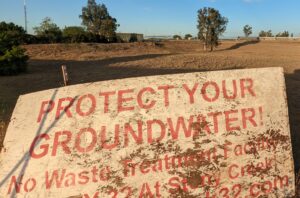by Todd Bishop, Sacramento Valley Mirror
posted Sept. 11
Lawsuits challenging the validity of Groundwater Sustainability Plans (GSPs) in Glenn, Colusa, and Butte counties will be allowed to proceed after three judges separately overruled efforts by local groundwater authorities to dismiss the cases based on legal technicalities.

In an Aug. 23 order, Colusa County Superior Court Judge Jeffrey A. Thompson disagreed with the Glenn and Colusa groundwater authorities and found that the plaintiffs in the case -— AquAlliance, California Sportfishing Protection Alliance and the California Water Impact Network -— were not precluded from pursuing the action under the California Sustainable Groundwater Management Act (SGMA).
Similar rulings were issued in July by Butte County Superior Court judges Stephen E. Benson and Tamara L. Mosbarger, allowing the same three groups to pursue lawsuits over the Groundwater Sustainability Plans for the Butte and Vina subbasins.
The goal of the lawsuits is “to protect the groundwater of this region, and use the courts to illustrate that these plans do just the reverse of that,” said Barbara Vlamis, executive director of AquAlliance, a Chico-based watchdog group focused on Northern California water issues.
Representatives of the Glenn and Colusa groundwater authorities, which developed the Colusa Subbasin Groundwater Sustainability Plan, declined to comment on the suit in response to an inquiry.
AquAlliance alleges that the Colusa subbasin GSP allows for significant failure of domestic wells before taking action, despite SGMA requirements to prioritize domestic wells.
“Far from halting overdraft and achieving balance between pumping and recharge, the Colusa Groundwater GSP accepts the failure of up to 20 percent of the domestic wells in the subbasin, significant and harmful land subsidence, the loss of up to 1 million acre feet of storage capacity, and harmful impacts to connected terrestrial ecosystems,” the lawsuit reads, in part.
Glenn County residents have reported 104 domestic wells experiencing groundwater supply problems this year, including 72 dry wells, as the impact of the drought spreads throughout the region. The numbers are in addition to 297 reports of groundwater problems in 2021, including 192 dry wells.
The area covered by the Colusa Subbasin groundwater plan is bounded by Stony Creek to the north, the Coast Ranges to the west, the Sacramento River to the east, and the Colusa-Yolo County boundary and the Colusa County Water District boundary to the south.
In the Butte subbasin, which includes southern Butte County and portions of Colusa and Glenn counties, AquAlliance says the plan allows groundwater levels to drop by up to 100 percent of the historic range, while allowing for failure of at least 7 percent domestic wells and significant loss of stream flow.
In the Vina subbasin, which stretches from the Durham area north to the Butte County line, including Chico, the group says the plan would allow hundreds of wells to fail, among other issues.
The groundwater authorities responsible for the plan had asserted that the groups lacked standing to file what are known as “reverse validation” actions challenging the GSPs. The judges disagreed.
In Colusa County, Judge Thompson agreed with the groundwater authorities that the groups had filed their case too soon after the completion of the Colusa Subbasin Groundwater Sustainability Plan. However, Thompson allowed the plaintiffs to refile their lawsuit to address that issue.
The Colusa Subbasin GSP was submitted to the state for review on Jan. 28, laying out a long-term strategy for groundwater conservation and recharge in the region.
The City of Orland, which took part in the formation of the Glenn Groundwater Authority and has been an active supporter of the process, cast the sole vote against the plan in advance of the submission to the state, saying it did not adequately protect domestic groundwater.
The California Department of Water Resources has declined to approve several other plans submitted previously by different groundwater authorities around the state, saying they “lack sufficient details” and need to address deficiencies before they can be approved.
Todd Bishop, a business and technology reporter based in Seattle, grew up in Orland and volunteers for the Sacramento Valley Mirror, where this story originally appeared. Subscribe to a PDF version of the newspaper at patreon.com/valleymirror.

I believe removing our groundwater will cause collapse of the caverns that hold the water and ground sinkage that can never be restored. Why is that not an issue? I live in Butte County.